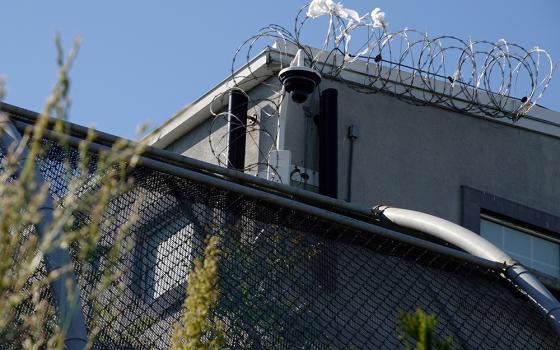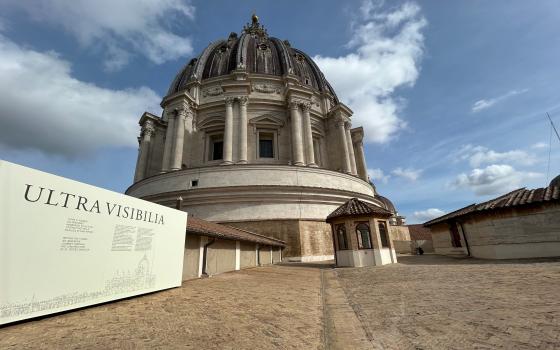Brandon Myrtle stands in the Guadalupe River as he tries to clear debris in Center Point, Texas, July 11 following catastrophic floods. More than 130 people — including at least 28 children— died after devastating flooding in the Texas Hill Country that began early on the Fourth of July. (OSV News/Reuters/Sergio Flores)
Many times, what is preached or written around the feast of the Transfiguration (Luke 9:28b-36) focuses on the physical appearance of Jesus changing — becoming radiant in some translations — or in the voice from the cloud announcing, "This is my beloved/chosen."
As I've prayed with this personally significant Gospel (I became an affiliate/postulant on the feast day, Aug. 6), this year I find myself wondering how Peter, James and John were transfigured by the experience — and how I'm being called to be transfigured.
We don't hear much about James and John individually in Scripture; they are often simply grouped with the others. Peter, on the other hand, is fairly well documented in his bold statements of faith (Matthew 16:13-20), his questionable comments (Matthew 18:21-22) and his denial of Jesus (Matthew 26:69-75). While it is impossible to know how each man's life changed, we do know all continued to journey with Jesus and participate in his ministry of challenging long-held "silly" rules and behaviors and bringing God to all people. I venture to guess everyone's experience with the historical Jesus was life-changing, sharing the mountain top experience of transfiguration would be among those life changing events.
While my appearance has never become dazzling or radiant and no voice has come from the cloud announcing God's pleasure with me, I have, nevertheless, experienced personal transfiguration. For example, entering an international religious community at age 22 was — and continues to be — a transfiguration experience, sometimes in spite of myself.
Initial formation expanded my experiences of community from local to global. Ongoing formation sees me in relationship with people and places around the world. While I have not traveled outside my United States province, I am privileged to have met sisters from each province or region of the community. Those relationships have transfigured me in ways I continue to discover.
I realize I can no longer simply exist in my little bubble of the world, unconcerned about what is happening around me.
For example, 10 years into my community life, I participated in a monthlong immersion experience for newer/younger members called International Community Experience. The program was often referred to as ICE. The Latin American participants were upset by the acronym, but I never really understood why. Fast-forward to the U.S. reality in 2025 — we have all heard the stories and may be living the reality of ICE raids and people simply disappearing. The recently built detention center nicknamed Alligator Alcatraz and the horror stories around it are more than enough for me to understand why a seemingly innocent acronym from so long ago was upsetting, even horrifying.
My ministry has transfigured me as well. I've been a high school educator for more than a generation, teaching mathematics, computer programming and theology, as well as holding administrative roles. When I first started as an educator, subject matter was the focus. After all, there were standardized tests and college admissions on the horizon, and students needed to be prepared. While student success is still important, it is not the only thing educators need to be concerned about. Not necessarily new, but definitely more prevalent, are topics of food and/or housing insecurity, and physical, emotional and mental safety. And while technology is great and a blessing in many ways, it also exposes everyone to abuse, exploitation and bullying in ways never seen before.
Now, the hardest transfiguration to recognize and embrace for me has been the spiritual one . Starting school right after Vatican II, I was part of the "Hi God" generation. Baltimore Catechism? No clue! Latin Mass? Huh? Gregorian chant I actually heard for the first time, and learned some of, in the novitiate, as we lived with a musician sister who offered to teach us. It was very fun to learn the notation and how to chant. Instead of memorized prayers in elementary school, we were taught a more conversational style. Even after all the years I've been in community, there are still things that trip me up. While I can appreciate and participate in formal prayer experiences, I'm much more comfortable in a relaxed setting.
Advertisement
The year 2025 brought a new archbishop to my diocese and a new pope to the world. I found myself watching and praying with all the rites and rituals — a first for me. I even brushed off my high school Latin so I could announce "Annuntio vobis gaudium magnum: Habamus papam" when Pope Leo XIV was presented to the world. No worries, I've not converted to "old school" or "high church" theology, but I have a new appreciation for some of it.
On a more personal level, I find myself arguing or yelling at God when I am overwhelmed by the reality of the world in which we live. The Texas floods that wiped out a summer camp and killed so many young ones — really God? People living in fear of disappearing due to deportation simply because of their skin color — again, really? My transfiguration isn't so much arguing or yelling, it's what comes next.
I realize I can no longer simply exist in my little bubble of the world, unconcerned about what is happening around me. While I've always been troubled by injustice, violence and so many other ills of society, transfiguration calls me to action.
What does it call you to?





